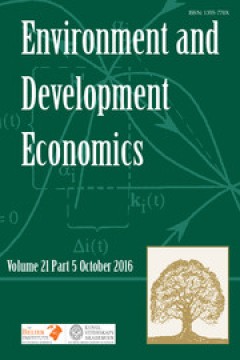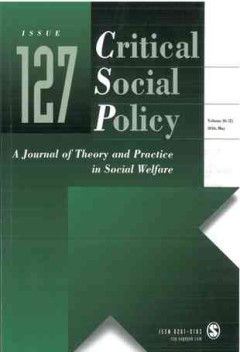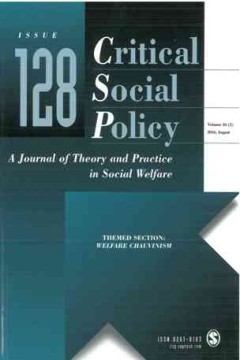Filter by

Community forests, carbon sequestration and REDD+: evidence from Ethiopia
REDD + is one of the tools under development to mitigate climate change, but it is not yet clear how to appropriately bring in the approximately 25 per cent of developing country forests that are managed by communities. Drawing on the economics of collective action literature, the authors attempt to shed light on whether forest collective action itself sequesters carbon. Using satellite imagery…
- Edition
- Volume 21 - Issue 2 - April 2016, pp. 249-272
- ISBN/ISSN
- 1355770X
- Collation
- -
- Series Title
- Environment and Development Economics
- Call Number
- -

Does Mexico benefit from the Clean Development Mechanism? A model-based scena…
Since 2000, the Clean Development Mechanism (CDM) under the Kyoto Protocol has included southern countries in the fight against climate change by encouraging northern countries to make environmentally friendly direct investments at the lowest cost in these developing nations. Although CDM investments have enjoyed great success, the question of the contribution of these investments to the develo…
- Edition
- Volume 21 - Issue 2 - April 2016, pp. 226-248
- ISBN/ISSN
- 1355770X
- Collation
- -
- Series Title
- Environment and Development Economics
- Call Number
- -

Climate change and the Ethiopian economy: a CGE analysis
The paper analyzes the economic impacts of climate change-induced fluctuations on the performance of Ethiopia's agriculture, using a countrywide computable general equilibrium (CGE) model. We model the impacts on agriculture using a Ricardian model, where current agricultural production is modelled as a function of temperature and precipitation, among other things, and where future agriculture …
- Edition
- Volume 21 - Issue 2 - April 2016, pp. 205-225
- ISBN/ISSN
- 1355770X
- Collation
- -
- Series Title
- Environment and Development Economics
- Call Number
- -

Exploring the scope for transboundary collaboration in the Blue Nile river ba…
In this study we model the preferences and willingness to pay (WTP) of downstream farmers in one of the largest irrigation schemes worldwide in Sudan for improved irrigation water supply through transboundary collaboration with farmers upstream in Ethiopia. In a choice experiment, Sudanese farmers are asked to pay an increase in existing irrigation fees to secure future irrigation water availab…
- Edition
- Volume 21 - Issue 2 - April 2016, pp. 180-204
- ISBN/ISSN
- 1355770X
- Collation
- -
- Series Title
- Environment and Development Economics
- Call Number
- -

Export of environmental goods: India's potential and constraints
Using data from the period 1996�2010, this paper identifies the nature of constraints that make India, which is one of the emerging environmental goods and services (EGS) exporters, unable to realize its export potential of environmental goods (EG). The empirical results show that the growth of India's exports of EG was negatively affected by �behind the border� constraints such as weak infrast…
- Edition
- Volume 21 - Issue 2 - April 2016, pp. 158-179
- ISBN/ISSN
- 1355770X
- Collation
- -
- Series Title
- Environment and Development Economics
- Call Number
- -

Wildlife conservation, labor supply and time values in rural Botswana
To improve wildlife conservation incentives in community-based natural resource management programs, a better understanding of rural communities' willingness to engage in wildlife conservation jobs is needed. We implement a discrete choice model explaining reservation wages for nine conservation jobs using contingent behavior data from rural Botswana residents. We present a model in which the c…
- Edition
- Volume 21 - Issue 2 - April 2016, pp. 135-157
- ISBN/ISSN
- 1355770X
- Collation
- -
- Series Title
- Environment and Development Economics
- Call Number
- -

The case of a needle exchange policy debate in Fresno, California
Needle exchange is one of the most effective public health interventions to prevent the transmission of infectious disease by injecting drug users. Despite the preponderance of scientific evidence, US federal funding for needle exchange programmes has been banned since 1988. This prohibition has resulted in the lack of a centralised policy on needle exchange and has given birth to a patch…
- Edition
- Volume 36, Issue 2, May 2016; pp. 289–306
- ISBN/ISSN
- -
- Collation
- -
- Series Title
- Critical Social Policy
- Call Number
- -

Undermining housing affordability for New York’s low-income households: The…
While public programmes, rent controls and subsidy schemes have not resolved New York�s historic and long-standing housing crisis, they have been important in dampening the housing problems of low-income New Yorkers. Along with an encroaching neo-liberal hegemony, however, since the 1990s redistributive policies have come under growing pressure. This article focuses on the neo-liberal restr…
- Edition
- Volume 36, Issue 2, May 2016; pp. 265–288
- ISBN/ISSN
- 02610183
- Collation
- -
- Series Title
- Critical Social Policy
- Call Number
- -

Putting victims first? A critique of Coalition anti-social behaviour policy
Anti-social behaviour (ASB) policy was not pursued by the Conservative�Liberal Democrat Coalition government with the same vigour as their New Labour predecessors. Where developments did take place a clear shift in emphasis was apparent, with the needs of ASB victims elevated to the forefront of policy. This article critically appraises two major developments that showcase the Coalition…
- Edition
- Volume 36, Issue 2, May 2016; pp. 246–264
- ISBN/ISSN
- 02610183
- Collation
- -
- Series Title
- Critical Social Policy
- Call Number
- -

Should irregular migrants have the right to healthcare? Lessons learnt from t…
This article critically evaluates the Royal Decree-Law 16/2012, which regulates migrants� access to public healthcare services in Spain. In particular, it examines the political rationale behind the restriction of migrants� access to primary and specialised healthcare services. We depart from the right to health as it is defined in the Spanish and international legislations to deconstru…
- Edition
- Volume 36, Issue 2, May 2016; pp. 225–245
- ISBN/ISSN
- 02610183
- Collation
- -
- Series Title
- Critical Social Policy
- Call Number
- -

Defamilisation and familisation measures: Can they reduce the adverse effects…
This article explores the impact of defamilisation and familisation measures for women with caring responsibilities and their implications for access to pensions in later life in Hong Kong and the UK in the context of pro-market pension reforms. The first part of the article discusses pro- market pension reforms and their effects on women, the second discusses the potential role of defamil…
- Edition
- Volume 36, Issue 2, May 2016; pp. 205–224
- ISBN/ISSN
- 02610183
- Collation
- -
- Series Title
- Critical Social Policy
- Call Number
- -

Designing electronic information systems for the future: Social workers and t…
There is a well-established critique of current forms of electronic information systems (IS) in social work organisations and attention is now turning to their redesign for the future. In this article we go beyond critiques that have established how this occurred to explore one of the reasons why current forms of IS have been observed to undermine frontline practice. In the same way that te…
- Edition
- Volume 36, Issue 2, May 2016; pp. 187–204
- ISBN/ISSN
- 02610183
- Collation
- -
- Series Title
- Critical Social Policy
- Call Number
- -

Beyond individualisation: The German ‘activation toolbox’
This article discusses recent debates on �activating� labour market policies in light of German reforms since 2003. Beckian and Giddensian theories of modernity, political economy, and the governmentality school all argue within a common paradigm of individualisation, assuming the �responsibilised� and isolated individual to be the focal point of activation policies. This paradigm is qu…
- Edition
- Volume 36, Issue 2, May 2016; pp. 167–186
- ISBN/ISSN
- 02610183
- Collation
- -
- Series Title
- Critical Social Policy
- Call Number
- -

Low road or high road? The post-crisis trajectory of Irish activation
Comparatively slow in adopting any clear activation strategy, post-crisis Ireland crossed the Rubicon and rapidly took steps to implement a work-first labour activation strategy. The article maps and examines the interaction of three variables � ideational influences, political interests and institutional processes � to assess the nature of post-crisis Irish activation policy. Troika im…
- Edition
- Volume 36, Issue 3, August 2016; pp. 432–452
- ISBN/ISSN
- 02610183
- Collation
- -
- Series Title
- Critical Social Policy
- Call Number
- -

Neoliberal paternalism and paradoxical subjects: Confusion and contradictio…
The twin thrusts of neoliberal paternalism have in recent decades become fused elements of diverse reform agendas across the advanced economies, yet neoliberalism and paternalism present radically divergent and even contradictory views of the subject across the four key spaces of ontology, teleology, deontology and ascetics. These internal fractures in the conceptual and resulting polic…
- Edition
- Volume 36, Issue 3, August 2016; pp. 412–431
- ISBN/ISSN
- 02610183
- Collation
- -
- Series Title
- Critical Social Policy
- Call Number
- -

Bordering practices in the UK welfare system
This article considers how chauvinistic welfare policies operate as a bordering practice. Taking the UK as an example, it examines a process in which welfare provisions have increasingly been withdrawn from a group of people designated as undeserving. It points out a close link between chauvinism based on ethnicity and that based on class. This relation is explored in detail for the cas…
- Edition
- Volume 36, Issue 3, August 2016; pp. 391–411
- ISBN/ISSN
- 02610183
- Collation
- -
- Series Title
- Critical Social Policy
- Call Number
- -

Populist radical right protectors of the folkhem: Welfare chauvinism in Sweden
The article scrutinises a version of welfare chauvinism taking shape in Sweden, by concentrating on the concept of folkhem (the [Swedish] people�s home), and examines how it was expressed in the 2010�2014 parliamentary activity of the Sweden Democrats. It offers an analysis of how the welfare chauvinism project is first contextualised in the party documents, and subsequently articulated…
- Edition
- Volume 36, Issue 3, August 2016; pp. 371–390
- ISBN/ISSN
- 02610183
- Collation
- -
- Series Title
- Critical Social Policy
- Call Number
- -

From welfare nationalism to welfare chauvinism: Economic rhetoric, the welf…
The article analyses the role and effects of economic cost and welfare state arguments in Finnish immigration politics and policies. It argues for a need to distinguish between welfare nationalist, welfare chauvinist and welfare exclusionist discourses. Through an examination of the immigration programmes of the political parties and parliamentary debates and policy documents mapping the ch…
- Edition
- Volume 36, Issue 3, August 2016; pp. 352–370
- ISBN/ISSN
- 02610183
- Collation
- -
- Series Title
- Critical Social Policy
- Call Number
- -

Deservingness in the Danish context: Welfare chauvinism in times of crisis
This article examines categories of deservingness in social policy. It argues that immigrant groups are positioned differently according to their status and perceived �value� for society. On the one hand, most states need several types of migrant labour; on the other hand, they wish to limit other types of migrants. The balance between humanitarian obligations and this urge to control has…
- Edition
- Volume 36, Issue 3, August 2016; pp. 330–351
- ISBN/ISSN
- 02610183
- Collation
- -
- Series Title
- Critical Social Policy
- Call Number
- -

The politics and policies of welfare chauvinism under the economic crisis
The ongoing economic crisis that emerged in the wake of the global recession in 2008, and was followed by the more recent crisis of the Eurozone, has introduced new themes and remoulded old ways of approaching the welfare state, immigration, national belonging and racism in Northern Europe. This article identifies two main ways of understanding welfare chauvinism: 1) as a broad concept …
- Edition
- Volume 36, Issue 3, August 2016; pp. 321–329
- ISBN/ISSN
- 02610183
- Collation
- -
- Series Title
- Critical Social Policy
- Call Number
- -
 Computer Science, Information & General Works
Computer Science, Information & General Works  Philosophy & Psychology
Philosophy & Psychology  Religion
Religion  Social Sciences
Social Sciences  Language
Language  Pure Science
Pure Science  Applied Sciences
Applied Sciences  Art & Recreation
Art & Recreation  Literature
Literature  History & Geography
History & Geography